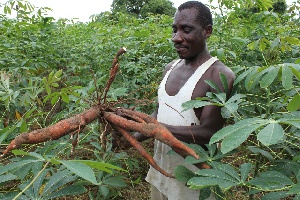Guinness Ghana Breweries Ltd. (GGBL) has selected Sunyani-West District in the Brong Ahafo Region as one of the designated areas in the country for mass collection of cassava tubers for the production of its new home-grown “Ruut Extra Premium Beer.”
This is to provide a ready market for cassava farmers in the district and spare them the annual ritual of post-harvest losses.
Sunyani-West District has become one of the cassava growing hubs in Brong Ahafo, thanks to the successful implementation of interventional programmes like the West Africa Agriculture Productivity Programme (WAAPP) and the Root and Tuber Improvement and Marketing Programme (RTIMP) being jointly sponsored by the International Fund for Agricultural Development (IFAD) and the Government of Ghana (GoG).
The move is in line with GGBL’s commitment to local agriculture and provides a positive impact on the local economy and farmers, particularly in the more deprived areas of the country.
The company has been investing in local raw material sourcing for more than a decade, working in partnership with local suppliers and farmers, the Ministry of Food and Agriculture (MOFA), NGOs and researchers to help develop sustainable local raw material supplies through improvement in productivity of farmers.
Currently, the company has impacted about 7,000 farmers in the three northern regions in Ghana through this initiative.
Speaking to the B&FT on the sidelines of a durbar commemorating the 29th National Farmers’ Day celebration at Kobedi in the Sunyani-West District, Mrs. Joyce Takyi Kemevor, the District MOFA Director, said the collaboration between MOFA and GGBL is another milestone in the quest to reduce post-harvest losses.
She said her outfit has started engaging more farmers, who they are going to trained in cultivating improved cassava with higher starch content. “We are looking forward to training not less than 500 farmers next year, while those who are already growing the specified type of cassava and are ready for harvest stand the chance of selling to GGBL.”
Mrs. Kemevor urged farmers in the district to take advantage of the partnership and other interventional projects and grow more cassava since there are ready markets for their produce.
She also entreated all stakeholders along the value-chain to give a helping hand in the fight against post-harvest losses as GGBL has shown, saying “MOFA cannot do it alone if we are to achieve any meaningful result of reducing post-harvest losses for sustainable food security and nutrition.”
Business News of Tuesday, 10 December 2013
Source: B&FT

















